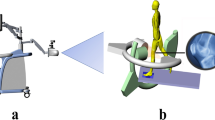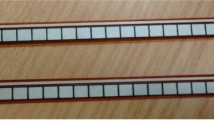Abstract
A method has been introduced in this paper to measure the kinematics of a knee joint and to use it as a boundary condition to model the knee’s mechanical behaviour. A mobile C-Arm fluoroscopy system (Ziehm Vision R) and a CCD camera were used for the measurement of a patient’s knee kinematics. The fluoroscopic images were recorded with 12 fps and then sent to Matlab software (Mathworks, Natick, MA, USA) for image processing. In parallel, CT scan images of the knee bones were used to create the 3D anatomical geometry of the knee by aid of Mimics software (Materialise NV). However, the geometrical model of the two medial and lateral menisci was generated from MRI data. The 3D geometrical model of the knee was then sent to Abaqus finite element software (Simulia Dassault Systems) to analyse the knee joint contact loads by introducing the boundary condition which was obtained from fluoroscopic images. The finite element model was used to evaluate the stress distribution on the cartilages during the gait. The result was then compared with the experimental data of gait analysis. The comparison between the results showed a close agreement between the two outcomes.










Similar content being viewed by others
References
Alam M, Amis AA, Bull AMG, Kessler O (2008) Changes in knee kinematics reflect the articular geometry after arthroplasty. Clin Orthop Reat Res 466:2491–2499
Albu AB, Bergevin R, Jean F (2009) Towards view-invariant gait modelling: computing view-normalized body part trajectories. Patt Recog 42:2936–2949
Argenson JA, Aubaniac J, Kelly MA, Komistek RD, Scott WN, Scuderi GR (2005) In vivo kinematic evaluation and design considerations related to high flexion in total knee arthroplasty. J Biomech 38:277–284
Astolfi L, Benedetti MG, Catani F, Fantozzia S, Leardini A, Vicecontic M (2005) Advanced multimodal visualization of clinical gait and fluoroscopy analyses in the assessment of total knee replacement. Comp Meth Biomed 79:227–240
Ateshian GA, Donzelli P, Mow VC, Spilker RL (1999) Contact analysis of biphasic transversely isotropic cartilage layers and correlation with tissue failure. J Biomech 32:1037–1047
Badea C, Pallikarakis N, Soimu D (2003) A novel approach for distortion correction for X-ray image intensifiers. Comp Med Imag Graph 27:79–85
Banks SA, Field RE, Moonot P, Rilton GT, Shang M (2009) In vivo weight-bearing kinematics with medial rotation knee arthroplasty. J Knee 17(1):33–37
Banks SA, Fregly BJ, Hamai S, Higaki H, Miura H, Moro-oka T, Shimoto T (2007) Can magnetic resonance imaging-derived bone models be used for accurate motion measurement with single-plane three-dimensional shape registration? J Orthop Res 25:867–872
Belvedere C, Benedetti MG, Catani F, Ensini A (2009) In vivo kinematics and kinetics of a bi-cruciate substituting total knee arthroplasty: a combined fluoroscopic and gait analysis study. J Orthop Res 27:1569–1575
Bingham J, Li G, Van de Velde SK (2008) Validation of a non-invasive fluoroscopic imaging technique for the measurement of dynamic knee joint motion. J Biomech 41:1616–1622
Bowers ME, Fleming BC, Tung GA (2007) Quantification of meniscal volume by segmentation of 3T magnetic resonance imaging. J Biomech 40:2811–2815
Burstein D, Eckstein F, Link TM (2006) Quantitative MRI of cartilage and bone: degenerative changes in osteoarthritis. NMR Biomed 19:822–854
Carter JN, Gordon L, Nixon MS, Veres GV (2004) What image information is important in silhouette-based gait recognition? IEEE Proc Comp Vis 2:776–782
Chen HL, Hsu HC, Kuo MY, Lu TW, Tsai TY (2008) In vivo three-dimensional kinematics of the normal knee during active extension under unloaded and loaded conditions using single-plane fluoroscopy. Med Eng Phys 30:1004–1012
Chizari M, Snow M, Wang B (2008) Post-operative analysis of ACL tibial fixation. Knee Surg Sports Traumatol 17(7):730–736
Chung YN, Lee JS (2005) Integrating edge detection and thresholding approaches to segmenting femora and patellae from magnetic resonance images. Biomed Eng Appl Basis Comm 17:1–11
Cicuttini F, Eckstein F, Peterfy C, Raynauld JP, Waterton JC (2006) Magnetic resonance imaging (MRI) of articular cartilage in knee osteoarthritis (OA): morphological assessment. Osteoarth Cart 14:A46–A75
Dennis DA, Hoff WA, Komisteck RD, Mahfouz MR (2005) Effect of segmentation errors on 3D-to-2D registration of implant models in X-ray images. J Biomech 38:229–239
Eckstein F (2006) Quantitative magnetic resonance imaging of osteoarthritis. Future Rheumatol 1:699–715
Erkel AV, Kaptein B, Nelissen R, Strien TV, Zwag EL (2009) Computer assisted versus conventional cemented total knee prostheses alignment accuracy and micromotion of the tibial component. Intern Orthop 33:1255–1261
Georgoulis AD, Moraiti C, Ristanis S, Stergiou N (2007) ACL deficiency affects stride-to-stride variability as measured using nonlinear methodology. Knee Surg Sports Traumatol 15:1406–1413
Gill TJ, Hosseini A, Kozanek M, Li G, Liu F, Rubash HE, Van de Velde SK (2009) Tibiofemoral kinematics and condylar motion during the stance phase of gait. J Biomech 42:1877–1884
Iwata S, Matsumoto H, Nagura T, Otani T, Suda Y, Toyoma Y (2007) Dynamic instability during stair descent in isolated PCL-deficient knees: what affects abnormal posterior translation of the tibia in PCL-deficient knees? Knee Surg Sports Traumatol 15:705–711
Mesfar W, Shirazi-Adl A (2006) Knee joint mechanics under quadriceps-hamstrings muscle forces are influenced by tibial restraint. Clinic Biomech 21:841–848
Author information
Authors and Affiliations
Corresponding author
Rights and permissions
About this article
Cite this article
Saveh, A.H., Katouzian, H.R. & Chizari, M. Measurement of an intact knee kinematics using gait and fluoroscopic analysis. Knee Surg Sports Traumatol Arthrosc 19, 267–272 (2011). https://doi.org/10.1007/s00167-010-1190-5
Received:
Accepted:
Published:
Issue Date:
DOI: https://doi.org/10.1007/s00167-010-1190-5




